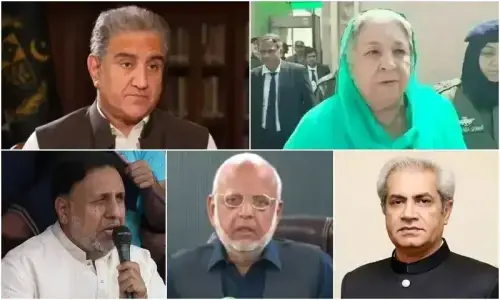WASHINGTON: The US Congress has removed a provision from the National Defence Authorisation Act 2018 that would have required the US Secretary of Defence to certify that Pakistan has taken steps to “significantly disrupt” the activities of both Lashkar-e-Taiba (LeT) and the Haqqani network.
The new version has confined this requirement to the Haqqani network only, indicating a desire in Washington to focus entirely on Afghanistan as long as it takes to subdue the Taliban insurgency there.
While the United States considers LeT a terrorist organisation, it also realises that the group’s main focus is Kashmir, not Afghanistan. Linking LeT to the Haqqani network, however, creates an impression that the US not only wants Pakistan to help it win the war against the Taliban but also wants it to change Islamabad’s position on Kashmir.
Since it already considers LeT a terrorist organisation, Washington will continue to ask Islamabad to stop the group from carrying out attacks inside India. But by delinking it from the Haqqani network, US policymakers are sending a message to Islamabad, that fighting the Haqqani network is their first priority.
This distinction is clearly underlined in a congressional document, the `conference’ version of the National Defence Act 2018. As part of the US legislative process, the House of Representatives and the Senate present their separate versions of a bill and then they go into a`conference’ to remove the differences between the two versions.
This joint version places the following additional limitation on reimbursements to Pakistan from the US Coalition Support Fund (CSF): Of the total amount of $700 million of reimbursements and support authorised for Pakistan during fiscal year 2018, $350m shall not be available unless the Secretary of Defence issues a certificate to the congressional defence committees.
His certificate should say that Pakistan continues to conduct military operations that are contributing to significantly disrupting the safe havens, fundraising and recruiting efforts, and freedom of movement of the Haqqani network in Pakistan.
Pakistan has taken steps to demonstrate its commitment to prevent the Haqqani network from using any Pakistan territory as a safe haven and for fundraising and recruiting efforts.
Pakistan is making an attempt to actively coordinate with Afghanistan to restrict the movement of militants, such as the Haqqani network, along the Afghanistan-Pakistan border; and Pakistan has shown progress in arresting and prosecuting senior leaders and mid-level operatives of the Haqqani network.
The House receded with an amendment that would have required the Secretary of Defence to issue a similar certification about LeT.
The conferees, however, expressed concern about the alleged persecution of groups seeking political or religious freedom in Pakistan, including the Baloch, Sindhi, and Hazara ethnic groups, as well as religious groups, including Christian, Hindu, and Ahmadi.
The conferees urged the Secretary of Defence to ensure that Pakistan is not using any assistance provided by the US to persecute minority groups.
In addition, the conferees authorised reimbursement of Pakistan for security activities along the Pakistan-Afghanistan border, including providing training and equipment for the Frontier Corps, Khyber Pakhtunkhwa.
However, the conferees expressed concern that Pakistan continues to delay or deny visas for US personnel that could assist with the provision of such training.
Given this situation, the conferees recommended that the US Department of Defence condition reimbursements for training and equipment with appropriate access by the US personnel.
The House bill contained a provision that would state that it is the sense of Congress that Dr Shakil Afridi is an international hero and that the government of Pakistan should release him immediately from prison.
The Senate amendment contained no similar provision and the House recedes.
The conferees noted the contributions of Dr Afridi to efforts to locate Osama bin Laden, and said that they “remain concerned about Dr Afridi’s continuing incarceration,” and urged the government of Pakistan to “release him immediately”.
Published in Dawn, November 14th, 2017



































